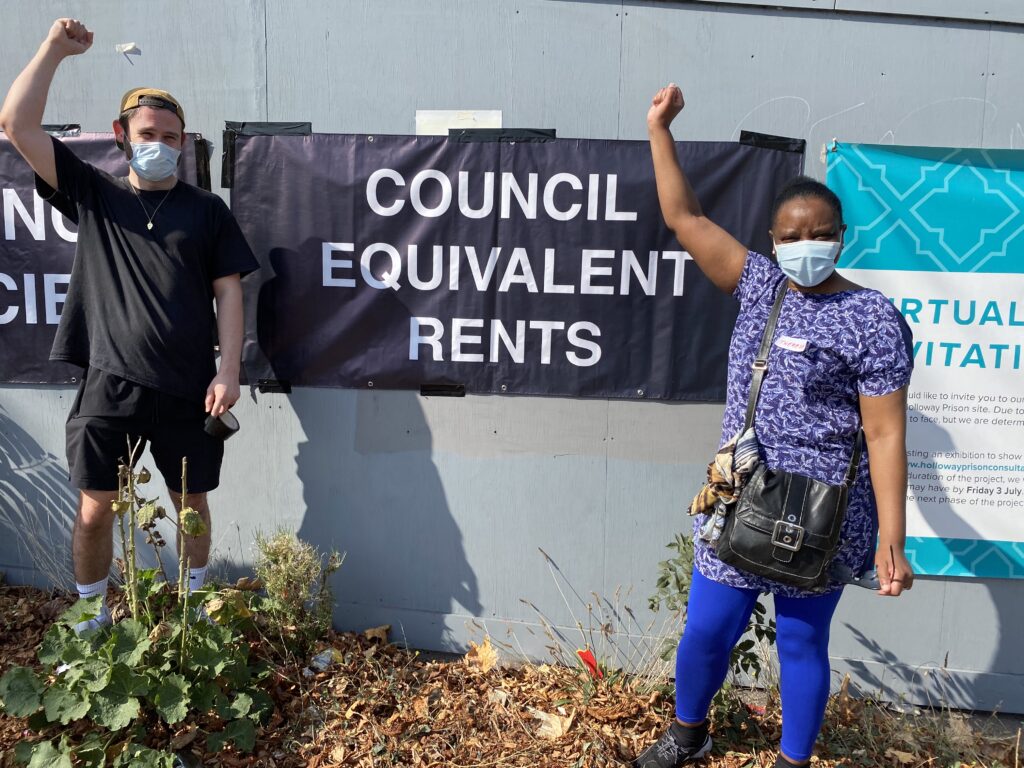Social Housing Working Group

We are the Community Plan for Holloway Social Housing Working Group and are committed to ensuring that Peabody provides an exemplary scheme with 60% genuinely affordable council-level social rent homes on the Holloway Prison redevelopment. We call for a majority of these homes to be quality family homes, including 4, 5 and 6-bedroom properties to meet the greatest need in the local area.
The housing crisis is one of the biggest challenges we face, with more than 14,000 people on Islington’s housing waiting list. There are also extremely high levels of overcrowding, people living in precarious insecure accommodation, homelessness, displacement from the borough and fuel and food poverty as people have little left over from extortionate private rents. As Peabody prides itself on being an affordable housing provider, we are here to ensure its historical legacy in this and the promises made are maintained.
PRESS RELEASE 14th December 2021.
For immediate release
Islington Homes for All asks if the social housing proposed by Peabody’s Peabody Housing Association on the Holloway Prison Redevelopment will meet Islington’s housing needs
With over 330 planning documents to look at, it has been a challenge to find out if the housing proposed on the Holloway Prison redevelopment will help meet local needs, a central question in a borough with thousands on the local authority’s housing waiting list and millions of public money invested into the site. The Holloway prison site was purchased with a £39.864 million public grant and a £41.638 million loan from the Greater London Authority. A further £10 million public grant was received from the Mayor last year to ensure Peabody delivered on the planning requirement for 42% social housing on the site. We see the provision of 42% social housing as a positive. But we would like to see more of the full 60% of the ‘affordable’ homes as socially rented, given the critical situation of low-income and key-worker households in the borough in housing need. We also wanted to know more about the quality of the housing offered, where it would be located, whether the 18% of ‘affordable’ homes would actually be affordable and if people living in social housing would be properly integrated into a site where 40% of the homes would be sold at full market price. We are still checking the numerous planning documents but with the D-day for Islington residents to be able to respond to the planning application looming far too soon –next week on Tuesday 21st December – we wanted to share what we have found out so far
- The blocks are segregated into either social housing blocks (social rent and/or shared ownership) or private blocks (housing for full market private sale). We have consistently urged for pepper-potting and at the minimum for tenure types to be mixed in the same block by being divided into different floors in the same block. This is important to enhance community cohesion on the site and avoid stigmatisation of social housing tenants. We have been told that two blocks at the back join a shared ownership and a private block, but notably this does not include social rent tenants, which only further lends a sense of difference and exclusion for this group. We therefore call for a revised plan that provides genuine social mixing across all tenure types.
- The majority of apartments facing the park are the private homes and the majority facing the main road are social rented homes, with three socially rented blocks on Parkhurst Road. This means that a disproportionate number of social rented homes are sited on the polluted main Road, with an estimated 25,000 vehicles passing on this road each day. These social tenants have poorer views, are exposed to higher noise levels and higher pollution levels. To avoid excessive noise and pollution the tenants are more likely to keep their windows shut which leads to increased problems with air flow and heat control. The acoustics advice is that opening a window in this location will lead to noise levels higher than recommended. We are particularly concerned about the current bias to poor locational positioning for the social tenures given the extent of public funding to buy the site and ensure a suitable social rent housing delivery. A more even distribution of tenure types across the sites is needed to share the burdens and benefits. This can be achieved by having mixed tenures within the blocks.
- The site is too dense with a total of 985 apartments. One of the social blocks on Parkhurst Road has a 15-floor height: the 14th floor is residential but above that is a rooftop plant enclosure, with the air source heat pumps, 2.5-3m high, making it up to the height of 15th floors. The over development of the site risks reducing the quality of the development, levels of residential amenity, daylight and sunlight. Whilst we welcome the much-needed housing, this should not be at the expense of the quality of the housing and public spaces. The high density also means that there will be wind tunnels and overshadowing of other buildings and public spaces and gardens. So we call for a less dense design that can deliver better quality homes and outdoor public spaces.
- Additionally, the high density increases the number of single-aspect apartments, resulting in at least half of the 985 apartments being single aspect. I.e with windows of the apartment being on only one side of the flat, facing the same direction with no through ventilation. We do not accept that the ‘stepped’ windows (similar to a bay window) are double aspect as termed in the application (”stepped/double aspect’”) when located on only one side of the apartment as there is still limited airflow through the home. Single aspect apartments – whether flat or stepped – increase the risk of overheating and have serious health, economic and environmental implications. This disproportionately impacts on social tenants with as disproportionate number of social rented homes are single aspect. This is contrary to Peabody’s own 2018 Design Guide that: “The majority of dwellings to be dual aspect with cross-ventilation, single aspect dwellings should be minimised.” So we ask that the vast majority of homes, including the social homes, be genuinely double aspect.
- 315 of the 415 social rent flats are 1-2 bedroom, but many more should be 3 and 4 bedroom flats as this reflects greatest need in the borough.
- 18% of the ‘affordable’ housing is proposed to be shared ownership but this is not affordable for median income households in Islington. Currently to purchase a Peabody two-bedroom shared ownership property in Islington with a 25% share requires a minimum household income of £67,546.00 (23rd Nov 2021 https://www.peabodysales.co.uk/developments/patchworks/prices-and-availability/shared-ownership/apartment-5-patchworks/). We therefore do not think there should be any shared ownership properties on the site; and that these should instead be a mix of social rent and London Living Rent, which are more affordable for ordinary Islington households.
We urge you to have your say. This is your chance to say what you want and how you think the current plan should be revised. It is important to express how you feel.Community Plan for Holloway has produced some useful guidelines to help you understand how to do this https://plan4holloway.org/how-to-have-your-say-on-the-plans/
End
Contact:
Debbie Humphry 07831 811490 humphrydebbie@gmail.com
Andy Bain Co-chair of Islington Homes for All andy@andybain.org



